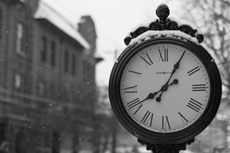Summer Time ends in UK, clocks go back amid chorus of grumbles
31 Oct 2016
In the UK, it's getting to that time of year when it's dark when people get up to go to work and then equally gloomy when they leave to go home. And the final nail in summer's coffin is the moment clocks go back, spelling farewell to British Summer Time until March next year, when clocks go back to it.
 This year, the exact time the clocks needed to be changed was 2 am on 30 October. And at London's landmark Big Ben, a dedicated team of five people takes all of four hours to do the needful.
This year, the exact time the clocks needed to be changed was 2 am on 30 October. And at London's landmark Big Ben, a dedicated team of five people takes all of four hours to do the needful.
For Britons, the obvious upside is the extra hour in bed on Sunday to help banish any leftover Halloween party hangovers. But this year carries greater significance than usual because it's the 100th anniversary of turning the clocks back.
The date the clocks go back changes each year on the last Sunday in October on the Gregorian calendar, and then are brought forward on the last Sunday in March.
And there is a growing chorus demanding that this century-old practice be ditched and Britain stick to Greenwich Mean Time – there is no escaping the dark side of time, they say.
Daylight saving nearly didn't happen, rejected by two parliamentary select committees. One astronomer said people should get up ''according to sense and the sun''. But politics stepped in when Germany tried it in 1916 and Britain followed hastily. The advance and retreat of the clocks remains a bone of contention.
The politics of time is not new, points out The Telegraph. When sundials were first installed in Rome, citizens rejected the new time discipline. ''Confound him,'' exclaimed Plautus, ''who in this place set up a sundial to cut and hack my days so wretchedly into small pieces!''
Until the 17th century, clockmakers in Europe - such as the creator of one the earliest astronomical clocks to depict a Copernican sun-centred universe in the Science Museum's forthcoming Mathematics: The Winton Gallery - feared persecution for heresy.
British clocks gradually standardised to GMT from the 1830s because of the needs of the railways, but it was Victorian politicians' concerns about licensing hours for establishments serving alcohol that led to legislation.
An international conference in 1884 proposed Greenwich as the world's prime meridian. The fallout was immense. For decades, the definition of time in France was ''Paris Mean Time retarded by nine minutes and 21 seconds'' – Greenwich Mean Time by another name, and a splendid piece of diplomatic footwork. Arguments still rage over time zones.
Infrastructure now runs on the super-accurate time kept by atomic clocks. But atomic and earth-rotation time do not run in perfect sync, so we have a system of 'leap seconds', which keep them tied together.
At least, it does for now. The leap second is under threat from technologists in industries such as banking where time-stamping is critical. Human operators inserting leap seconds can make mistakes and the argument goes that we should simplify matters, keeping atomic time only. But this would mean severing the connection with earth-rotation time.
More noticeable than an occasional second would be the changes if Britain moves to Central European Time, or Double British Summer Time (DBST). This has been tried before, as has staying one hour ahead of GMT all year. Both experiments ended because shifting away from GMT caused as many problems as it solved. While DBST might benefit south-east England, people in the North, Scotland and Northern Ireland face even darker mornings.
Perhaps British Summer Time itself was a step too far, suggests Dr David Rooney, keeper of technologies and engineering at the Science Museum, London and lead curator of mathematics at the Winton Gallery.
He writes in The Telegraph that in 1970, the novelist A P Herbert proposed its abolition. His ''painless plan'' was to change local working hours instead of the clocks, getting the benefits of daylight saving such as accident reduction, but with fewer side effects. It was an argument for localism that sounds remarkably fresh today.


















